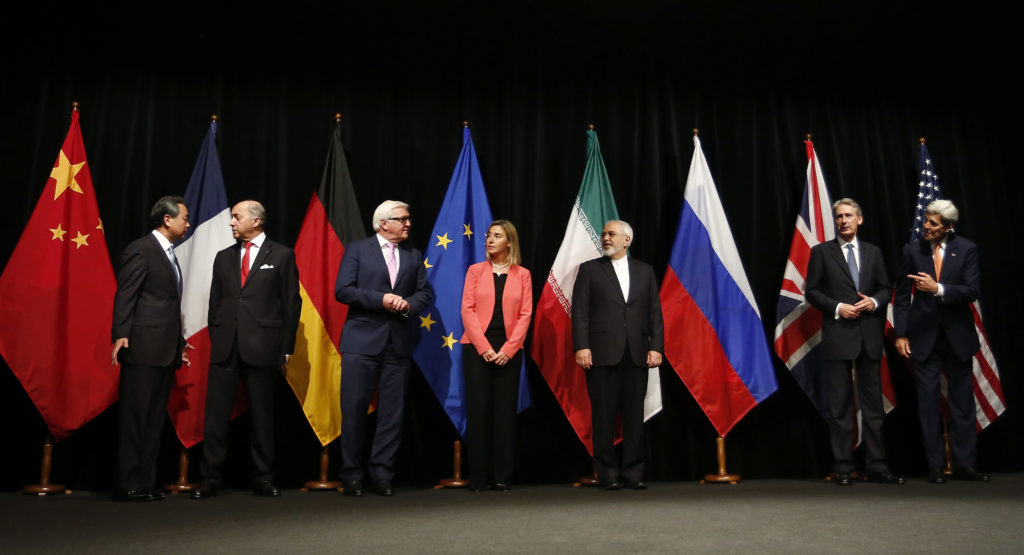IN THE MEDIA
Mess in the Middle East
February 9, 2021 | Oved Lobel, Tzvi Fleischer

Daily Telegraph – 9 February 2021
Iran is playing a dangerous game of nuclear chicken with the incoming Biden administration, attempting to panic them into immediately lifting sanctions and re-entering the badly flawed Joint Comprehensive Plan of Action (JCPOA) nuclear agreement without amendment.
Teheran’s hope is that the new Administration will throw away the sanctions leverage built by the previous administration’s “maximum pressure” campaign in exchange for a return to a deal which basically permits Iran to build an unlimited nuclear program in just a few short years.
President-elect Biden and his advisers have made clear they intend to re-engage Iran and re-enter 2015 JCPOA deal, but then “strengthen and extend [its] provisions, while also addressing other issues.” Iran hopes nuclear extortion will force the Administration to forget about that whole vital second step.
If they succeed, Teheran wins, and gets to build a full-blown nuclear program with international approval in just a few years times. Starting in 2025, “sunset clauses” in the JCPOA begin gradually lifting all restrictions on enriching uranium, permitting Teheran to enrich it to any level in any amount. Once that happens, Iran can effectively build nuclear weapons at any time, because there will be no warning time at all when they decide to do so to give the international community time to react.
Thus, it’s vital that the Biden Administration not blink or panic in the face of the current provocative steps taken by Iran to expand its nuclear program.
Since the Trump administration repudiated the JCPOA in May 2018, Iran has been attempting to bring the US back into the agreement without preconditions and remove the severe economic pressure it has experienced as a result of the sanctions. Beginning in May 2019, Iran gradually and openly expanded areas of its nuclear program beyond the limits set by the deal, including enriching uranium to forbidden levels, accumulating it in forbidden amounts, and employing advanced centrifuges disallowed by the deal.
Following the killing in November of Mohsen Fakhrizadeh, a scientist and Islamic Revolutionary Guard Corps (IRGC) Brigadier General overseeing Iran’s nuclear program, the regime has dramatically escalated this expansion. It is now touting the resumption of uranium enrichment to 20%, a level of enrichment with no civilian use, but which, in terms of technical difficulty, is very close to 90% “weapons-grade” enriched uranium.
The legislation mandating this expansion also requires Iran to severely restrict the access of International Atomic Energy Agency (IAEA) inspectors if sanctions aren’t lifted by February 21, among other alarming steps.
Yet this is not Iran’s rush for a bomb. This is simply the hostage diplomacy the regime has engaged in since 1979 – no different from the abduction of British-Australian academic Kylie Moore-Gilbert and dozens of others or the recent impounding of a South Korean-flagged oil tanker to extort financial concessions from Seoul.
Iran hopes to use this nuclear escalation as a bartering chip in negotiations with the Biden administration in order to quickly force a “compliance-for-compliance” return to the JCPOA in which the US lifts sanctions first, the JCPOA restrictions expire in a few years, and Iran gets military nuclear capabilities with little risk or cost.
But immediate sanctions relief without attempting to trade it for Iranian concessions would simply remove any compelling incentive for Iran to cooperate in any follow-on negotiations, either to strengthen and extend the JCPOA or deal with Teheran’s missile program and widespread regional destabilisation and support for terrorism.
Nor is there any reason to trust Iran would reverse all its current JCPOA violations once sanctions were lifted.
Such a move would also demonstrate the Administration’s desperation for a deal, any deal, automatically giving Iran the upper hand in any negotiations.
Finally, immediate sanctions relief and re-entry into the JCPOA without consulting regional allies will fulfil an Iranian goal of creating friction between the US and its partners in the Middle East, all of whom feel threatened by Teheran.
The new Administration must recognise what Iran is attempting to do and formulate policy accordingly. It must demand full JCPOA compliance by Iran before any significant sanctions are lifted. And even after such compliance occurs, leverage must be maintained to force Teheran back to the negotiating table.
Fortunately, many US sanctions on Iran are not nuclear-related, but targeted at Teheran’s other rogue behaviours – missile-building, terrorism, subverting neighbours, targeting shipping, human rights abuses,etc. If preserved and strengthened, these measures have the ability to keep the pressure on the Iranian regime even after an ostensible return to compliance with the JCPOA takes place.
In addition, on top of the economic leverage due to “maximum pressure”, the US and Israel have demonstrated they have essentially free rein to eliminate senior Iranian officials, sabotage Iranian nuclear facilities and conduct serious cyberattacks against Iran. The incoming administration therefore has a variety of economic and non-economic options available to respond to nuclear violations, and other rogue behaviours.
Veteran US statesman Henry Kissinger recently said, “I don’t believe that the spirit [of the Iran deal], with a time limit and so many escape clauses, will do anything other than bring nuclear weapons all over the Middle East.”
The new US administration needs to internalise this wisdom and recognise that the JCPOA is no solution to the Iranian nuclear problem, but must, at best, be an interim stepping stone to something better.
Dr. Tzvi Fleischer is Editor in Chief of the Australia/Israel Review, published by the Australia/Israel & Jewish Affairs Council (AIJAC). Oved Lobel is a policy analyst at AIJAC.
Tags: IAEA, Iran, JCPOA, Middle East





